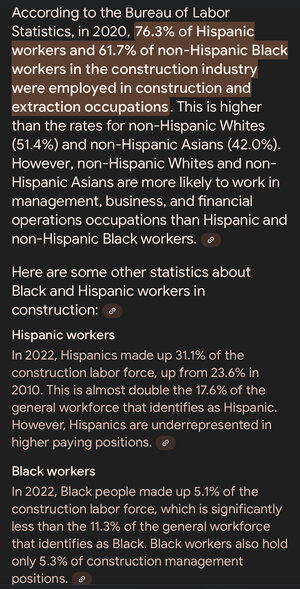Y
In my estimation part of what’s happening is illegal immigrants are more willing to take entry level jobs at lesser pay. Which brings down what companies expect to pay someone for entry level job. When you add in inflation and how ridiculous cost of living is now younger people can hardly afford to tough it out for a few years taking an entry level construction job before they get better pay. It’s why there is such a need for younger workforce in construction. If these companies didn’t have the ability to save costs hiring illegals they would be forced to treat those already employed and those thinking about starting a career in construction better. What I’ve seen happen is younger guys will leave and take a dead end job at Wal-Mart making 3-4 bucks more an hour instead of sticking it out because they can’t financially do it and can’t wait 3-4 years to start making decent money.
OK, that's fair. What you're saying is that the availability of immigrant labor drives down wages. That has nothing to do with "black jobs," or anything Trump was talking about, right? We can agree on this point, right? It also has nothing to do with inflation, assuming that wages are keeping up with inflation (they are).
The idea that immigrants drive down wages in their new country is an old one. And in the short-run, it's not necessarily wrong. In the long-term, it is wrong, because immigrants consume as much as they produce. So immigrants maybe take a construction job that others don't really want. Well, that immigrant has to eat, so there's now more demand for restaurants. The person who might otherwise have been banging roofs can now be a cook. And the availability of immigrant labor means that more houses get constructed, which means more construction material has to be produced. So the would-be roofer might instead manufacture or distribute shingles. The immigrant will probably also buy a car, which means more auto industry jobs, etc.
The way to know that immigrants do not drive down wages or take jobs is to think about how much immigration we have had over the years. In the last century alone, there have been tens of millions of immigrants and even more children of immigrants -- and yet native-born citizens still have jobs. How about wages? Working-class Americans have a standard of living that is much higher than the middle-classes in developing world economies. Because, in the long-run, wages are determined mostly by productivity.
Economists have studied this question for literally millions of man-hours. The short-term effects of immigration on wages is a subject of some dispute, ASAIK. Nobody thinks it has a large effect on wages, but there are some economists who think it has a short-term effect; others look at the data and see no effect at all. ASAIK no economists -- no respected professional ones, at least -- think that immigration lowers wages over the long-term. In fact, the consensus is that immigration usually has a slightly beneficial effect on wages, though that's less true in a free trade economy.
Are we on the same page now?

